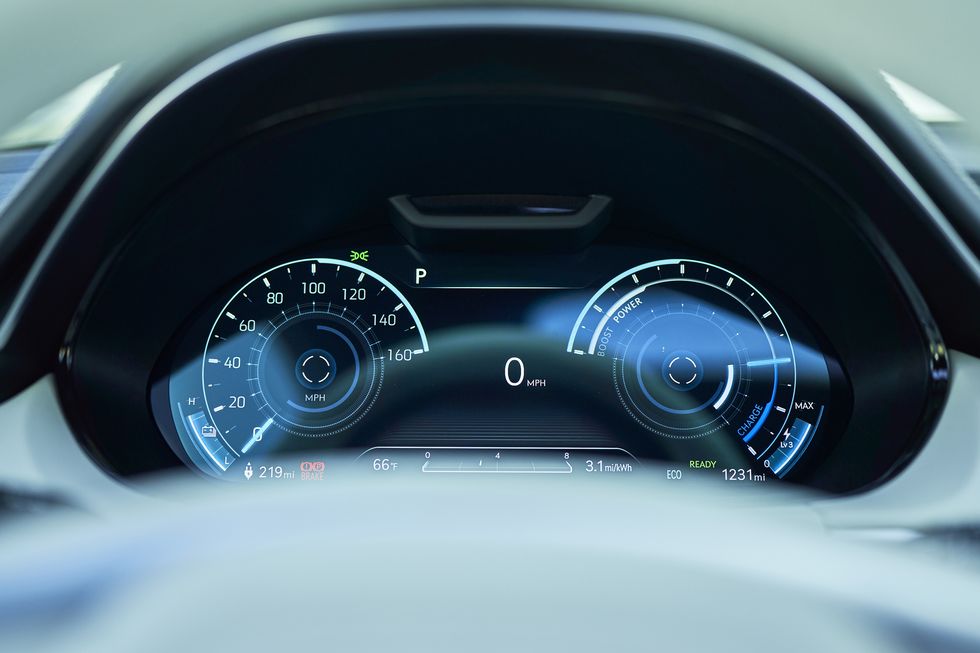2023 Genesis Electrified GV70 Generates Giggles without Gas

Stomping on an EV’s go pedal never gets old. We’re addicted to the thrill of instant thrust, which gets even harder to resist when it can be amplified at any time. That’s why the 2023 Genesis Electrified GV70 needs a warning label that reads: Boost mode can be habit-forming and may cause bouts of spontaneous acceleration.
Hit the Boost button at the bottom of the electric GV70’s steering wheel, and the dual motors’ peak output jumps from 429 to 483 horsepower for up to 10 seconds. That window is wide enough to dart past other drivers dilly-dallying on the highway. It’s also great for generating giggles but bad for preserving the 77.4-kWh battery’s state of charge, as we recently found out on the freeways and roads around Atlanta.
Genesis
The Electrified GV70 is the third electric model Genesis has launched in the last year, joining the smaller GV60 SUV and the Electrified G80 sedan. The trio is currently sold in 15 states, with Louisiana, Texas, and Wisconsin recently joining the ranks as availability continues to expand.
Overdosing on Overboost
The Electrified GV70 isn’t a performance-oriented model, but it’s arguably more fun to drive than the gas-powered GV70 3.5T Sport Prestige. While they look almost identical, you can identify the new electric version by its closed-off grille (with a hidden opening to access the charge port), as well as specific 20-inch wheels and restyled bumpers. It also lacks tailpipes, instead emitting strange humming sounds to alert pedestrians of its presence.
More on the Electrified GV70
While this GV70 is an electrified copy of its gas-fed siblings, from behind the wheel, we discovered electric means more athletic. The EV shares Michelin Primacy Tour A/S all-season tires with the 3.5T, and its floor-mounted battery pack lowers the center of gravity, adding a dash of extra stability. The brake pedal isn’t always reassuring, though—a byproduct of poor blending between friction and regenerative brakes.
The Electrified GV70 makes up for that miscue with its 483-hp punch. Genesis says there’s no limit to how many times the overboost function can be triggered; the fun is only done when the battery runs out. Drive like we did (for a while) down south and plan on calling a tow truck before reaching the Genesis’s estimated range of 236 miles. That figure is notably lower than the Tesla Model Y (up to 330 miles) but higher than the Lexus RZ (196 or 220 miles, depending on wheel size). It’s also one mile better than the EPA-estimated range for the 2023 Genesis GV60 Performance, with which it shares its all-wheel-drive powertrain.
Intoxicated by the exciting takeoffs it allows, we were gratuitous with Boost mode at the start of the drive but sobered up as we watched the Electrified GV70’s indicated range dive at an alarming rate. Hooking up to an 800-volt DC fast-charger can restore roughly 60 miles in five minutes or take the battery from 10 to 80 percent in 18 minutes, a feat we’ve already verified ourselves with a GV60. Unfortunately, Genesis’s curated driving route didn’t include any charging stops, so we had to fight the urge to keep hitting the Boost button and floor it.
A more relaxed right foot also ended our wrestling match with the electric GV70’s steering wheel, which was riddled with torque steer during Boost mode’s hard launches. Our focus on conserving electrons instead had us toggling through four brake-regen settings while using the steering-wheel-mounted paddles. The strongest option provided comfortable one-pedal driving, but we could barely differentiate between the middle two.

Genesis
Worth It to Pass on Gas?
Compared with its gasoline counterparts, the Electrified GV70 has a stiffer structure and additional sound deadening, both of which improve on what was an already serene cabin environment. It might even be too quiet because there was nothing to drown out the wind noise we noticed coming from the A-pillars at highway speeds.
Inside, there’s almost nothing that differentiates this Genesis as an EV, aside from the menus in its digital gauge cluster and wide infotainment display. We also wish Genesis would add wireless Apple CarPlay and Android Auto—the fact that they still require a cord is a bummer.
Thankfully, opting for the EV doesn’t require too many sacrifices. Interior and cargo space are virtually identical between ICE and electric, with the latter measure coming out to 29 cubic feet behind the rear seats for both. The two GV70 variants also have the same 3500-pound tow rating, but any trailering will substantially diminish range. The EV also has vehicle-to-load capability, so it can double as a small generator and supply up to 1.9 kW to power ancillary devices.
The Electrified GV70 is the first Genesis model to be built in America and not in South Korea. Since it’s an SUV that starts under $80K and is assembled at Hyundai’s factory in Montgomery, Alabama, it qualifies currently for the full $7500 federal tax credit under the Inflation Reduction Act. However, that discount could drop to $3750, depending on the government’s pending battery-sourcing rules.
The federal kickback is another reason to choose the Electrified GV70 over the extremely similar GV60 Performance, which is all but identical to the GV70 in price, size, and powertrain. Genesis tells us that the funkier-looking GV60 is meant to appeal to those already interested in an EV, while the GV70 will do a better job convincing the ICE crowd.
Before incentives, the Electrified GV70 starts at $67,550 for the Advanced trim level. We drove the fancier $74,350 Prestige model, which adds a 3-D digital gauge cluster with a head-up display, nappa leather, heated rear seats, an upgraded Lexicon stereo, and more. Due to production limitations, Genesis will only offer four grayscale paint colors to start (we dig the lone matte finish).
Neither Electrified GV70 is a great value, especially compared with the sub-$45K four-cylinder model. Things look different when the 375-hp twin-turbo V-6 gets involved. The V-6 version begins at around $56K, and opting for the fancy Sport Prestige trim adds nearly $10K to the bottom line, thrusting it into the EV’s (pre-tax-credit) price bracket.
The fuel-sipping GV70 is already one of our favorites, evidenced by its spot on our list of the 10Best Trucks and SUVs for 2023. We’ll need to spend more time with the new electric version before bestowing equal praise. Still, its unexpectedly fun personality helps its odds, and anything that makes us giggle without gas gets extra kudos.
Arrow pointing downArrow pointing down
Specifications
Specifications
2023 Genesis Electrified GV70
Vehicle Type: front- and rear-motor, all-wheel-drive, 5-passenger, 4-door wagon
PRICE
Base: $67,550
POWERTRAIN
Front Motor: permanent-magnet synchronous AC
Rear Motor: permanent-magnet synchronous AC
Combined Power: 483 hp
Combined Torque: 516 lb-ft
Battery Pack: liquid-cooled lithium-ion, 77.4 kWh
Onboard Charger: 10.9 kW
Peak DC Fast-Charge Rate: 240 kW
Transmissions, F/R: direct-drive
DIMENSIONS
Wheelbase: 113.2 in
Length: 185.6 in
Width: 75.2 in
Height: 64.2 in
Passenger Volume, F/R: 55/46 ft3
Cargo Volume, Behind F/R: 57/29 ft3
Curb Weight (C/D est): 5000 lb
PERFORMANCE (C/D EST)
60 mph: 3.8 sec
100 mph: 9.4 sec
1/4-Mile: 12.3 sec
Top Speed: 151 mph
EPA FUEL ECONOMY
Combined/City/Highway: 91/98/83 MPGe
Range: 236 mi

Senior Editor
Eric Stafford’s automobile addiction began before he could walk, and it has fueled his passion to write news, reviews, and more for Car and Driver since 2016. His aspiration growing up was to become a millionaire with a Jay Leno–like car collection. Apparently, getting rich is harder than social-media influencers make it seem, so he avoided financial success entirely to become an automotive journalist and drive new cars for a living. After earning a degree at Central Michigan University and working at a daily newspaper, the years of basically burning money on failed project cars and lemon-flavored jalopies finally paid off when Car and Driver hired him. His garage currently includes a 2010 Acura RDX, a manual ’97 Chevy Camaro Z/28, and a ’90 Honda CRX Si.







